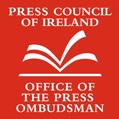 Section 44 (also here) of the Defamation Act, 2009 (also here) provides that the Minister for Justice may by recognise a body as the “Press Council” , and Schedule 2 (also here) to the Act sets out the minimum requirements such a body must meet to be so recognised. The Irish media established a Press Council of Ireland and the Office of the Press Ombudsman with effect from 1 January 2009, and the Minister announced yesterday that this would be recognised as the Press Council for the purposes of the Act (here’s the press release, with added links):
Section 44 (also here) of the Defamation Act, 2009 (also here) provides that the Minister for Justice may by recognise a body as the “Press Council” , and Schedule 2 (also here) to the Act sets out the minimum requirements such a body must meet to be so recognised. The Irish media established a Press Council of Ireland and the Office of the Press Ombudsman with effect from 1 January 2009, and the Minister announced yesterday that this would be recognised as the Press Council for the purposes of the Act (here’s the press release, with added links):
…Ahern to seek Oireachtas approval for formal recognition of the Press Council
The Minister for Justice, Equality and Law Reform, Mr. Dermot Ahern, T.D., announced today that he is asking the Dáil and Séanad to approve an Order by him declaring the formal recognition of the Press Council of Ireland as the “Press Council”.
Minister Ahern said that the application from the Press Council of Ireland under section 44 of the Defamation Act 2009 has been examined with reference to the requirements in Schedule 2 of the Act and that he was satisfied that the application met those requirements.





